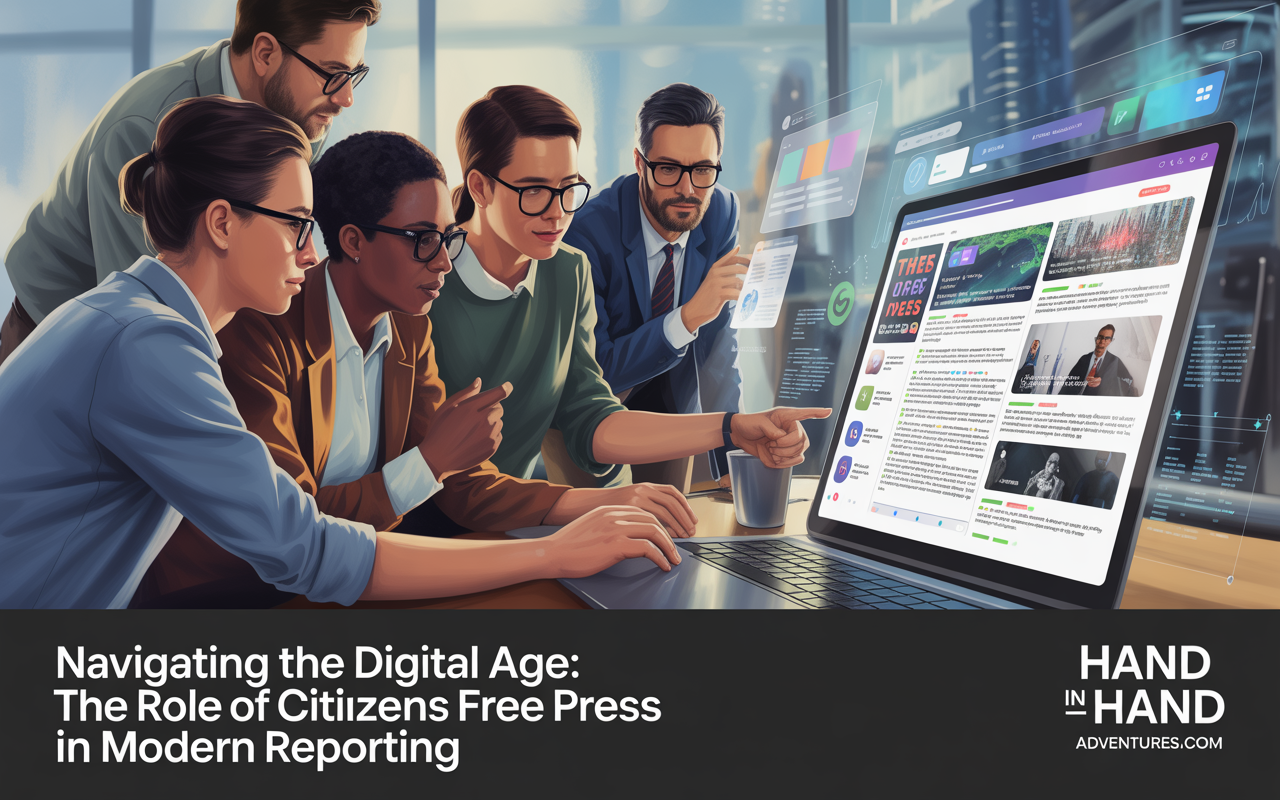The digital age has revolutionized the way information flows and shapes our world. With smartphones in hand, everyone now has the power to report news as it happens, blurring the lines between traditional journalism and citizen involvement. Enter Citizen’s Free Press—an innovative platform that empowers ordinary people to share stories that matter. In a time when trust in mainstream media is waning, this grassroots movement offers fresh perspectives and timely updates directly from those on the front lines of events. As we dive deeper into this new era of reporting, let’s explore how citizen journalists are making their mark and what it means for all of us seeking truth in an ocean of content.
The Rise of Citizen Journalism and Its Importance in Modern Reporting
Citizen journalism has transformed the media landscape in recent years. Ordinary individuals now possess the power to report news as it unfolds, using smartphones and social media platforms.
This shift democratizes information sharing. It allows diverse voices to emerge, often covering stories that mainstream outlets might overlook. From local events to global crises, citizen journalists provide critical perspectives.
In many cases, they act as watchdogs during times of political unrest or societal change. Their ability to capture real-time events can challenge established narratives and hold powerful entities accountable.
Moreover, citizens often build trust within their communities. They offer firsthand accounts that resonate more deeply than distant reports from traditional newsrooms.
As a result, citizen journalism plays an essential role in fostering transparency and encouraging public discourse in modern reporting. The immediacy and authenticity brought by these grassroots reporters cannot be underestimated.
The Role of Citizen’s Free Press in Providing Unbiased and Timely Information
Citizen’s Free Press serves as a vital platform in today’s information landscape. By empowering ordinary individuals to share news, it fosters transparency and accountability. This democratization of journalism allows for diverse voices that might otherwise be silenced.
Timeliness is crucial in reporting, and Citizen’s Free Press excels at delivering real-time updates from the ground level. These citizen journalists often capture events as they unfold, providing insights that traditional media may overlook or delay.
Unbiased reporting is another significant strength of this platform. Unlike mainstream outlets sometimes influenced by corporate interests, citizen journalists offer perspectives grounded in personal experience. They can report without the constraints often imposed by editorial boards.
This creates an environment where trust flourishes between readers and reporters. The immediate access to unfiltered information encourages audiences to engage with current events actively and thoughtfully.
Challenges Faced by Citizen Journalists in the Digital Age
Citizen journalists often find themselves battling a multitude of obstacles in the digital landscape. One major challenge is credibility. With misinformation rampant online, establishing trust can be daunting.
Access to resources also proves difficult. Unlike traditional reporters who have networks and funding, citizen journalists typically operate on limited budgets and tools. This lack of support can hinder their ability to deliver comprehensive coverage.
Legal issues further complicate matters. Citizen journalists must navigate laws surrounding defamation, privacy, and copyright while striving for transparency in their reporting.
Additionally, many face harassment or backlash for their views or findings. The anonymity of the internet sometimes emboldens those who disagree with them to lash out harshly.
Staying updated with rapid technological advancements requires constant adaptation. Citizen journalists must learn new platforms and tools just to keep pace with the evolving media environment.
Ethical Considerations for Citizen Journalists
Citizen journalists play a crucial role in the media landscape. However, they must navigate ethical challenges that can arise from their unique position.
Accuracy is paramount. Without professional training, citizen journalists may struggle to verify facts or sources. Misreporting can lead to misinformation spreading rapidly online.
Accountability also poses a concern. Unlike traditional reporters, citizen journalists often lack institutional backing. This absence can create issues when it comes to correcting mistakes or addressing public concerns about content integrity.
Privacy matters too. Capturing events live can inadvertently infringe on individuals’ rights. Citizens should be mindful of the impact their reports might have on those involved in sensitive situations.
Bias needs careful consideration. Personal opinions may color reporting unintentionally, affecting objectivity and trustworthiness in coverage. Balancing passion with impartiality remains essential for credible journalism today.
Case Studies: Successful Examples of Citizen Journalism
One striking example of citizen journalism emerged during the Arab Spring. Ordinary citizens took to their smartphones, capturing moments of protest and upheaval. They shared real-time reports that traditional media struggled to cover due to restrictions.
In another instance, the Boston Marathon bombing showcased how bystanders became critical informants. Their photos and videos helped authorities piece together events as they unfolded.
Social media platforms also played a pivotal role in amplifying these voices. The hashtag #BlackLivesMatter brought grassroots activists into mainstream conversations about racial justice, demonstrating the power of everyday individuals in shaping narratives.
These case studies highlight not just the impact but also the resilience of citizen journalists who fill gaps left by conventional outlets. Their contributions often lead to more immediate and relatable storytelling that resonates deeply with audiences worldwide.
The Future of Modern Reporting with the Help of Citizens Free Press
The landscape of journalism is evolving rapidly. As traditional media faces numerous challenges, platforms like Citizens Free Press are stepping in to fill the void. With their focus on delivering unbiased and timely information, they empower ordinary citizens to share their stories and perspectives.
As technology continues to advance, citizen journalism will likely play an increasingly vital role. The ability for anyone with a smartphone to capture events as they unfold has transformed how news is reported and consumed. This democratization of information means that diverse voices can now contribute to the narrative.
However, it remains essential for citizen journalists to navigate the ethical complexities inherent in reporting. Balancing speed with accuracy is critical as misinformation can spread just as quickly as legitimate news stories.
Looking ahead, Citizens Free Press stands at the forefront of this transformation in modern reporting. By fostering an environment where accountability and transparency thrive, they pave the way for a more informed public discourse.
With continued support for citizen journalists and innovative approaches to news delivery, we may witness a future where everyone plays a part in shaping our understanding of current events. The power lies not only in traditional outlets but also within each individual willing to report on what matters most—creating a rich tapestry of information that reflects our society’s diverse experiences.

